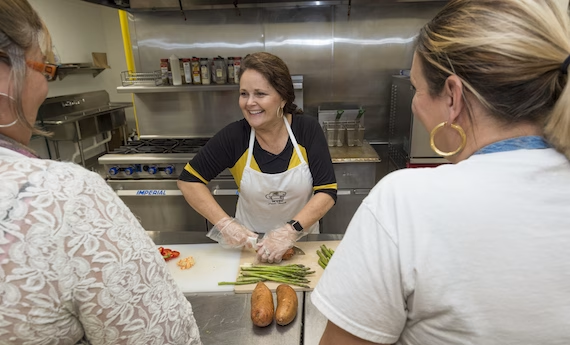Contact: Jack Bailey (304) 766-4109 jbaile19@wvstateu.edu INSTITUTE, W.Va. – A program led by West Virginia State University (WVSU) Extension Service is helping West Virginians struggling with substance use disorders to make smarter, healthier choices on their road to recovery.
An initiative of the USDA, the Expanded Food and Nutrition Education Program (EFNEP) provides instruction on health, nutrition and physical activity but does not traditionally target recovering addicts. With West Virginia being labeled by some as “ground zero for the opioid epidemic,” WVSU is taking a unique approach to help people in need.
“EFNEP wasn’t actually designed to reach this population,” said Tammy Hauldren, a WVSU EFNEP extension associate, “but we have such a need in West Virginia that it only seemed fitting to bring this information to the people we serve.”
While the program traditionally targets low-income families, Hauldren began offering the EFNEP classes at sites such as Recovery Point in Charleston and Huntington to help people in recovery learn the basics of good health and nutrition. Through weekly classes, participants are learning to be more physically active, drink more water and spend wisely at the supermarket.
“Often, our participants know little about grocery shopping and how to spend their money on healthy items in the store, so we cover everything from how to make a list to buying lean protein and making three healthy meals from it,” Hauldren said.
Such information is proving invaluable, as Hauldren has seen firsthand.
“You have given me inspiration and support and some valuable classes in a short time,” said Craig Rhodes, a recent participant in one of Hauldren’s classes. After completing treatment, Rhodes has transitioned into being a full-time caregiver for his two grandchildren. “What I learned from your class has really helped me. I never would’ve dreamed I would be raising these children alone.”
Lessons on health-conscious spending, proper nutrition and serving sizes are supplemented with physical activity to get participants moving.
“In Huntington, for instance, we’ll go to Ritter Park and walk or jog three to four miles,” Hauldren said. “Many participants smoke and drink lots of soda, so while I’m with them, there is none of that. One of the first things I cover is the benefit of replacing sugary sodas and energy drinks with water.”
Another first, she said, is building trust. While EFNEP requires six lessons for each course, Hauldren has expanded that to 10 to help establish and nurture a relationship with participants.
“You have to build a relationship and let participants know you’re there to help, to sow seeds of hope as they move through their recovery process,” she said. “So those first couple of lessons, especially, are about building trust as we ease into the core of the program.”
The approach is paying off, as Hauldren has seen participants learn and benefit from making healthy choices by the end of her time with them.
“I had one man say to me, ‘Ms. Tammy, I’ve been shooting up heroin for 16 years. Why should I care about what I’m going to eat now?”’ she said. “What I try to impart onto them is that what you eat has everything to do with your recovery.”
Hauldren is thankful, she said, because the need for programming like EFNEP is so great in West Virginia. The state has one of the nation’s highest rates of deaths from drug overdoses. As people move into recovery from addiction, understanding how nutrition and physical activity play a role in that process is vital.
Hauldren maintains a growing waiting list of organizations wanting EFNEP. In addition to Recovery Point Charleston and Huntington, she has brought EFNEP to such sites as Putnam County Drug Court and the Pregnancy Connections program at Thomas Memorial Hospital. She will soon begin offering courses at a site in Wayne County.
Developed by the USDA in 1969, EFNEP has successfully addressed critical societal concerns by employing paraprofessional staff and influencing nutrition and physical activity behaviors of low-income families, particularly those with young children. Through a community-based, relationship-driven, hands-on educational approach, EFNEP has directly impacted economic obesity and food insecurity challenges that hinder the health and wellbeing of the nation.
To learn more, contact Hauldren at (304) 552-0075 or .
Follow on Facebook, Instagram and Twitter .

West Virginia State University Program Helping Recovering Addicts Improve Their Health
November 16, 2017